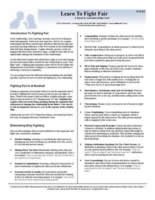All Couples Should Learn To FIght Fair. Here's How
Check out our mini-guide on how to fight fair, and stop letting badly handled conflict cause pain in your relationships. Download it NOW!
Search Our Network Of Business and Personal Development Sites
Destructive Communication - Insinuation
Work911 - Help @ Work
Communication File - Improve Communication By Eliminating Insinuation By Robert Bacal
Summary: Using insinuating language (insinuations) is a cowardly and week method of attacking another person without taking responsibility for one's opinions or position. Learn about insinuation and the damage it causes to effective communication.
Consider this. Maria, head of her department, has a concern about the dedication of one or two of her staff members. Maria learned somewhere that it's not good to embarrass anybody in public, so at the next staff meeting, she says: "I have some concerns about some people in our department who seem uncommitted and unwilling to go the extra mile. I want it clear that we need maximum effort from everyone." And, she leaves it at that. Is this a good way to approach the issue?
Well, it certainly doesn't single out anyone, hence avoiding public embarrassment. But how do you think staff will react? First, each and every person in the room will wonder if they've somehow offended the boss. That's ALWAYS the first reaction to what we call "insinuation". The next reaction is: "Oh, right, Maria must be talking about Jethro (or some other coworker." Perhaps more serious is the effect this type of communication has on trust. Because of the lack of clarity and ambiguity, it wouldn't be surprising if staff began to doubt the boss's honesty or straightforwardness.
Insinuation isn't used only by managers. Many people use it rarely. Some people use it often. Each use of insinuation increases distrust, damages the work environment and has the potential to trigger very destructive conflict.
So, what's insinuation? Insinuation refers to a statement that is ambiguous, vaguely put, and generally negative. The nature of insinuation is that it is deniable, and that's one reason why people use it. It avoid addressing issues straight up and directly, and therein lies its destructiveness. The use of insinuation pushes solutions much farther away because it disguises the issue, and creates additional mistrust.
Here's another example. Over coffee Mark is talking to Fred, one of his coworkers. Mark says: "I don't want to name names but it's pretty obvious that someone around here isn't interested in anything but his own job." Can anything good come from this? I doubt it. It isn't meant to SOLVE the problem. It isn't being discussed with the right person (who would obviously be the person that remains unnamed). It's just sneaky, deniable back-stabbing.
So, What Can I Do?
First, if you have something to say don't cloak it in vagueness or insinuation. Realize that such remarks won't get anything solved, and are liable to make things worse for everyone, including you.
Second, take some responsibility. If you have a concern, then have the courage to take it up with the person in question, in private, and try to work it out. Don't snipe from afar. If private conversations fail, then it may be appropriate to bring it up in a more public setting, but present it in the spirit of solving a problem, and make sure you take responsibility for your comments and opinions.
Third, understand that people use insinuation when they feel uncomfortable with expressing their anger or frustration, but can't discipline themselves to keep their mouths shut. Or, perhaps their frustration levels are so high, they aren't thinking clearly. If you are tempted to insinuate, ask yourself this question: "Am I saying this in the spirit of trying to solve a problem, or am I saying this because of some selfish motive or because I'm too uncomfortable to approach this constructively? If it's the latter, don't say it.
Finally, keep in mind that every time you use insinuation you will be seen as less courageous, more manipulative and less trustworthy by the majority of people who hear you. This applies even for people who might "congratulate you" on your insinuation, for they, too will realize that your next target might be them.
 Manage Conflict - Resolve Conflict - Prevent Conflict
Manage Conflict - Resolve Conflict - Prevent Conflict 

